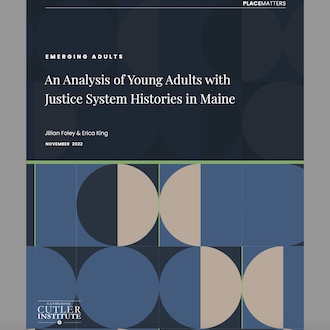A new report from the Catherine E. Cutler Institute at the University of Southern Maine shows 1 in 10 young adults ages 18 to 24 in Maine have had some level of contact with the Maine Department of Corrections.
The study examined a snapshot of data provided by MDOC in April 2021 and aimed to better understand the makeup of young adults who have been impacted by Maine’s criminal justice system. The data included all young people in Maine who were aged 18 to 24 at the time of the extract and had previous contact with the Department of Corrections, not including the county jail system.

The report, titled “Emerging Adults- An Analysis of Young Adults with Justice System Histories in Maine,” found that while a large number of young adults in Maine (over 12,000) had been previously referred to the juvenile justice system, most (86%) were never incarcerated, and the majority had not returned to the system as adults.
“We know that emerging adults come into contact with the criminal justice system at disproportionately high rates in Maine just as is true nationally, and there are a number of factors that contribute to this,” said Jillian Foley, a policy associate at the Catherine Cutler Institute and the report’s lead author. “Research shows that people in this age group experience a number of developmental, social, and health challenges that contribute to these trends and when we support them to overcome these challenges in their communities they can thrive in adulthood.” Of the 18 to 24-year-olds in Maine who were committed to an adult facility, the most common offense involved substance-use.
The report also found that young adults who were identified as BIPOC experience higher rates of contact with the MDOC system. Young people who are Black or African American are two times as likely to enter the MDOC system compared to their white counterparts. Compared to Maine’s overall 18-to-24-year-old population estimates, the researchers report a higher proportion of both men and BIPOC individuals with histories of incarceration.
“The findings in this report have been supported in previous research and we must recognize that these disparities in Maine are unacceptable,” said co-author Erica King, advisor to the Place Matters team and senior manager at the Center for Effective Public Policy. “This transitional period in the life of young adults is absolutely critical for building the equitable pathways to positive social and economic opportunities that Maine’s youth deserve.”
A highlight of the report shows relatively low rates of incarceration among 18-to-24-year-olds with juvenile referral histories, demonstrating successful diversion efforts by MDOC. In a series of recommendations that reinforce key findings from related studies in Maine, the report calls for an expansion of these pretrial diversion efforts. In addition, the authors suggest prioritizing substance and mental health treatment, anti-racism strategies, and policies that minimize the lifelong impact of criminal records on access to employment and housing. “Community-based supports that focus on connection and provide stability are key for this population,” said Ms. Foley. “Investing in positive outcomes for all of Maine’s young people will promote safety and wellbeing in Maine’s local communities.”

